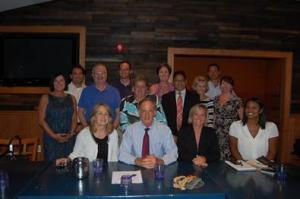Carper: Best way to help people is to create jobs
As southbound traffic on Route 1 crawled slowly past Bethany Blues BBQ near Midway Aug. 9, Sen. Tom Carper sat inside the restaurant holding a roundtable discussion with the state’s top tourism, hotel and restaurant industry officials.
Carper opened the discussion telling about his visit with young elementary school students who asked him what his job is.
“I told them my job is to help make the rules for our country.” And then he added, “I get to help people. The best thing you can do to help people is to make sure they have a job.”
In this area, Carper said, jobs have been created by the $100 million Indian River Inlet bridge construction, and by beach replenishment in the vicinity.
A few miles inland near Millsboro, he said, Allen Harim Corp. is planning to convert the old Vlasic pickle processing plant into a high-tech, chicken processing operation. The facility could employ more than 700 people and would need more than 100 farmers to raise birds.
Carper said Delaware is shifting around what he has called the state’s four Cs - corn, chickens, chemicals and cars, to reemphasize a fifth C - coastline.
The restaurant industry is the fourth-largest employer in the state.
Carper calls for reducing recidivism
As a society, Carper said, we need to figure out how to reduce recidivism. “We have to be smart enough to come up with a solution. Ninety-eight percent of people who go to prison are going to come out,” he said.
Carper said pending legislation could boost employment by increasing the nation’s border and port security workforce by 21,000, to add to about 20,000 existing officers.
He said many Mexican citizens want to be able to easily cross into border states to earn enough money to support their families, and then go home.
“We spend more money on southern border protection than we do on all law enforcement combined in the country,” Carper said.
He said technology has made it quicker to process incoming tractor-trailers and vessels. Customs and Border Patrol officers use ELMOcargo, a device that wirelessly accesses cargo data and permits field personnel to facilitate release of cargo.
Using ELMOcargo, border officers can now process seven trucks in the time it took to process one, Carper said.
But people who have planned to commit acts of terrorism have used, and most likely still do use border crossings into the country from Mexico and Canada.
About 10 days earlier Carper, who is chairman of the committee on homeland security and governmental affairs, said he attended a meeting with people who have top-secret U.S. intelligence clearance.
The meeting provided information about the U.S. State Department’s decision to close more than two dozen embassies and consulates in the Middle East and North Africa after receiving what it called credible information indicating terrorist groups seek to continue attacks against the U.S.
Carper said he couldn’t go into detail but he did say, “It would make the hair on the back of your neck stand up, the things that are being fomented against us.”
National park still alive
Carper said Delaware - The First State - is still the only state in the nation that does not have a national park.
He said in 2004, it looked like a portion of the Great Cypress Swamp, which is adjacent to Route 54 in southern Sussex County, looked like it was going to work.
“But we ran into some hunting guys down there,” Carper said, referring to a nearby hunt club whose members didn’t like the idea of having a national park as their neighbor.
Since then, Carper has been promoting the idea of having a portion of Delaware’s national park in each county.
“We have a hell of a story to tell in Delaware, and we’re going to get a national park. Never give up; never give up,” he said.
Linda Parkowski of the Delaware Tourism Office said transportation is the biggest challenge the agency faces. “Transportation is part of the visitor experience,” Parkowski said, suggesting that beach-bound visitors sitting in traffic on Route 1, a highway-turned-parking-lot, were not having fun.
“Never let off the pedal of beach replenishment,” Cindy Small told Carper. Small, executive director of the Kent County Tourism and Convention Bureau, said ongoing beach and dune replenishment and stabilization is critical to ensuring continuance of those natural assets.
“We want the water to be clean, and we want people to enjoy the bounty of tax-free Delaware,” Carper said.
Editor's note: This story has been revised to note the restaurant industry is the fourth-largest employer in the state and to eliminate a statement about the tourism workforce.






















































